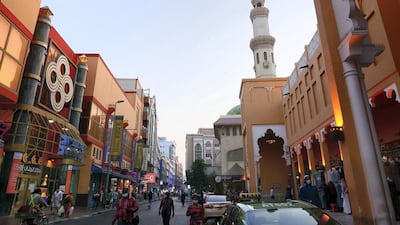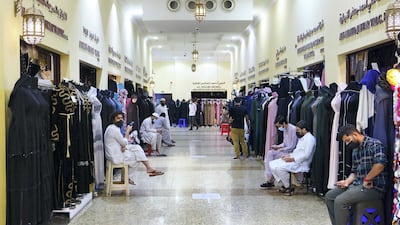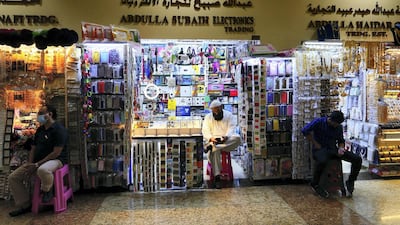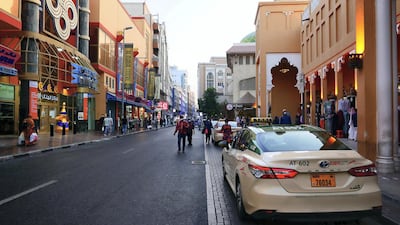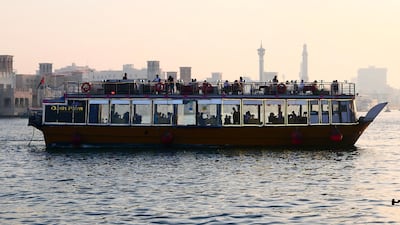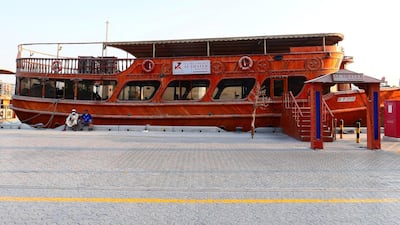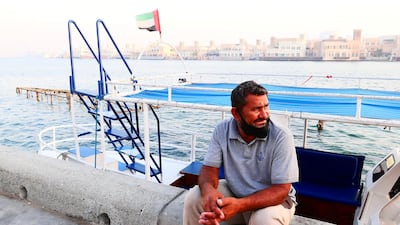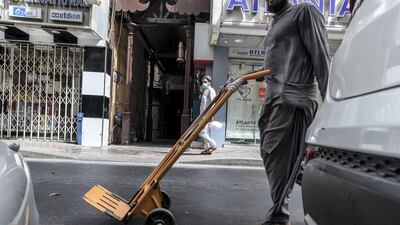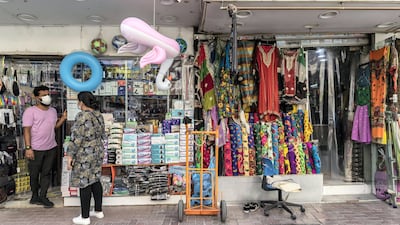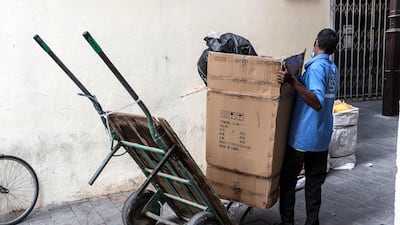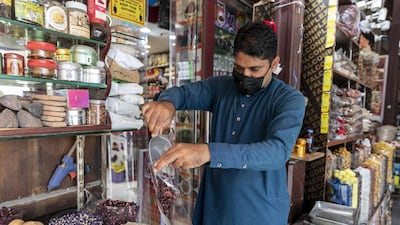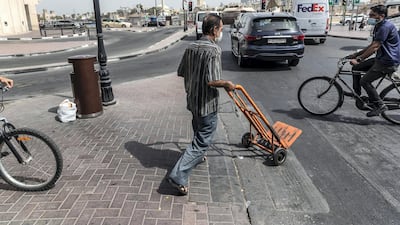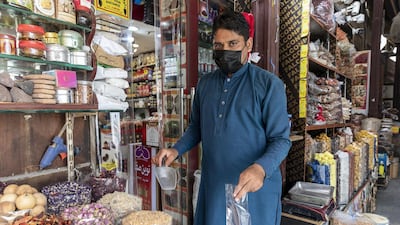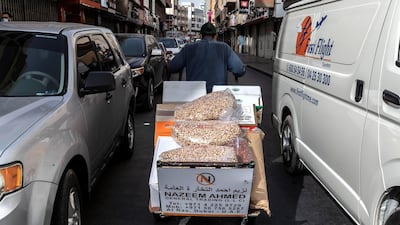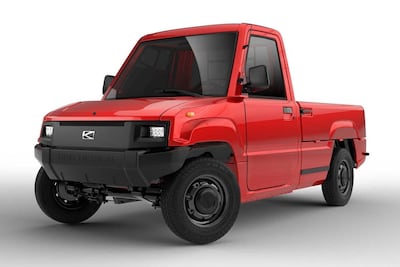Hundreds of traditional dolly carts used by porters in one of the oldest districts of Dubai are to be replaced by small, modern, Uber-style pick-up trucks.
Dubai Police said the carts would be taken off the streets of Naif, and shoppers would soon be able to use licensed vehicles ordered through a mobile app.
The move will help to regulate the work of porters and prevent theft and accidents in the area, officials said.
Police recently employed new tactics to eradicate crime in the neighbourhood, including the recent introduction of a plainclothes police unit.
Some men overstaying their visas work as porters. They sometimes steal a box or two from goods they are carrying, thinking no one will notice
Hundreds of shops selling goods such as spices, carpets and clothing are spread across Naif, and many owners use the services of porters for as little as Dh30 ($8).
"Some men overstaying their visas work as porters. They sometimes steal a box or two from goods they are carrying, thinking no one will notice," said Col Omar Ashour, deputy head of Naif police station.
“The proposal suggests replacing carts with vehicles that look like small pick-up trucks that can be ordered through a dedicated app.
"Each will have to be registered and carry a number plate to help track its route."
Crime is rare in Dubai, Abu Dhabi and Sharjah – three of the 10 safest cities in the world – but police said that, inevitably, opportunistic thefts happen.
A Dubai Police bike unit was launched about five years ago to reduce incidents involving porters.
Authorities handled 354 cases of theft and accidents in the area in the first three months of this year, compared with 676 last year.
“Random moving of goods on dolly carts has caused congestion, accidents and thefts, but since we launched our bikers unit, these problems dropped significantly,” Col Ashour said.
“We have seen a remarkable decline in the number of all types of reports, from 3,223 between January and March last year to 1,877 the same period this year."
The police also launched its Compass Team, which has 17 undercover officers in Naif to monitor the area.
Col Ashour said the team had helped to reduce the level of petty crime, including theft, by 75 per cent.
A six-member team to study trends and suggest solutions was also formed.
“This team examines reports to figure out reasons behind crimes, then comes up with ways to reduce them,” Col Ashour said.
“For example, the team examined reports about thefts from shops. They narrowed down the reasons behind these thefts to shops hiring people on visit visas.”
An awareness campaign was launched with help from the infiltrators department after the team reported their findings.
The drive educated shop owners about the dangers of hiring illegal workers and also helped to reduce crime.
Shop owners in the neighbourhood said they were now more vigilant regarding illegal porters.
Mohammed Naseem, a salesman at a spice shop, said he always asked for a receipt from a porter.
“We always write down everything we are handing over to the porter and we each keep a copy, so we know what is being delivered,” he said.
"There are a few cases where some porters steal one little thing, but the ones who have been working here for many years are well reputed and their services are used by many shops. It's some of the newer ones who started working recently or a few years ago who steal."
Rouf Teecey, who has worked as a salesman in the area since 2006, said “most porters are reliable”, but there were a few that would have to be monitored.
He said some shop owners started to use licensed delivery services so they could track their goods.
“Many shops use porters because it is very cheap and it gets the job done, but more owners are starting to use licensed delivery companies so they feel more secure,” Mr Teecey said.
“I think if dolly carts get replaced with licensed pick-up trucks, it could offer even more security to shops here and also protect the porters.”
He said the number of workers with expired residence visas had grown slightly since the start of the Covid-19 pandemic.
He said these men started working as porters in the area to earn an income.
“These are some of the newer ones who are stealing one or two things from the goods, but the old ones are well known by many shop owners here,” he said.
Deira mosque is older than the UAE – in pictures
Lexus LX700h specs
Engine: 3.4-litre twin-turbo V6 plus supplementary electric motor
Power: 464hp at 5,200rpm
Torque: 790Nm from 2,000-3,600rpm
Transmission: 10-speed auto
Fuel consumption: 11.7L/100km
On sale: Now
Price: From Dh590,000
The specs
Engine: 4.0-litre V8 twin-turbocharged and three electric motors
Power: Combined output 920hp
Torque: 730Nm at 4,000-7,000rpm
Transmission: 8-speed dual-clutch automatic
Fuel consumption: 11.2L/100km
On sale: Now, deliveries expected later in 2025
Price: expected to start at Dh1,432,000
Profile of RentSher
Started: October 2015 in India, November 2016 in UAE
Founders: Harsh Dhand; Vaibhav and Purvashi Doshi
Based: Bangalore, India and Dubai, UAE
Sector: Online rental marketplace
Size: 40 employees
Investment: $2 million
THE LOWDOWN
Romeo Akbar Walter
Rating: 2/5 stars
Produced by: Dharma Productions, Azure Entertainment
Directed by: Robby Grewal
Cast: John Abraham, Mouni Roy, Jackie Shroff and Sikandar Kher
UAE currency: the story behind the money in your pockets
The%20specs%3A%202024%20Mercedes%20E200
%3Cp%3E%3Cstrong%3EEngine%3A%20%3C%2Fstrong%3E2.0-litre%20four-cyl%20turbo%20%2B%20mild%20hybrid%0D%3Cbr%3E%3Cstrong%3EPower%3A%20%3C%2Fstrong%3E204hp%20at%205%2C800rpm%20%2B23hp%20hybrid%20boost%0D%3Cbr%3E%3Cstrong%3ETorque%3A%20%3C%2Fstrong%3E320Nm%20at%201%2C800rpm%20%2B205Nm%20hybrid%20boost%0D%3Cbr%3E%3Cstrong%3ETransmission%3A%20%3C%2Fstrong%3E9-speed%20auto%0D%3Cbr%3E%3Cstrong%3EFuel%20consumption%3A%20%3C%2Fstrong%3E7.3L%2F100km%0D%3Cbr%3E%3Cstrong%3EOn%20sale%3A%20%3C%2Fstrong%3ENovember%2FDecember%0D%3Cbr%3E%3Cstrong%3EPrice%3A%20%3C%2Fstrong%3EFrom%20Dh205%2C000%20(estimate)%3C%2Fp%3E%0A
Bawaal%20
%3Cp%3E%3Cstrong%3EDirector%3A%3C%2Fstrong%3E%20Nitesh%20Tiwari%3C%2Fp%3E%0A%3Cp%3E%3Cstrong%3EStars%3A%3C%2Fstrong%3E%20Varun%20Dhawan%2C%20Janhvi%20Kapoor%3C%2Fp%3E%0A%3Cp%3E%3Cstrong%3ERating%3A%3C%2Fstrong%3E%201%2F5%3C%2Fp%3E%0A
Inside%20Out%202
%3Cp%3E%3Cstrong%3EDirector%3A%C2%A0%3C%2Fstrong%3EKelsey%20Mann%3C%2Fp%3E%0A%3Cp%3E%3Cstrong%3EStarring%3A%3C%2Fstrong%3E%C2%A0Amy%20Poehler%2C%20Maya%20Hawke%2C%20Ayo%20Edebiri%3C%2Fp%3E%0A%3Cp%3E%3Cstrong%3ERating%3A%20%3C%2Fstrong%3E4.5%2F5%3C%2Fp%3E%0A
UAE%20SQUAD
%3Cp%3EMuhammad%20Waseem%20(captain)%2C%20Aayan%20Khan%2C%20Aryan%20Lakra%2C%20Ashwanth%20Valthapa%2C%20Asif%20Khan%2C%20Aryansh%20Sharma%2C%20CP%20Rizwaan%2C%20Hazrat%20Billal%2C%20Junaid%20Siddique%2C%20Karthik%20Meiyappan%2C%20Rohan%20Mustafa%2C%20Vriitya%20Aravind%2C%20Zahoor%20Khan%20and%20Zawar%20Farid.%3C%2Fp%3E%0A
UAE currency: the story behind the money in your pockets
The Africa Institute 101
Housed on the same site as the original Africa Hall, which first hosted an Arab-African Symposium in 1976, the newly renovated building will be home to a think tank and postgraduate studies hub (it will offer master’s and PhD programmes). The centre will focus on both the historical and contemporary links between Africa and the Gulf, and will serve as a meeting place for conferences, symposia, lectures, film screenings, plays, musical performances and more. In fact, today it is hosting a symposium – 5-plus-1: Rethinking Abstraction that will look at the six decades of Frank Bowling’s career, as well as those of his contemporaries that invested social, cultural and personal meaning into abstraction.
LA LIGA FIXTURES
Thursday (All UAE kick-off times)
Sevilla v Real Betis (midnight)
Friday
Granada v Real Betis (9.30pm)
Valencia v Levante (midnight)
Saturday
Espanyol v Alaves (4pm)
Celta Vigo v Villarreal (7pm)
Leganes v Real Valladolid (9.30pm)
Mallorca v Barcelona (midnight)
Sunday
Atletic Bilbao v Atletico Madrid (4pm)
Real Madrid v Eibar (9.30pm)
Real Sociedad v Osasuna (midnight)
The specs: 2018 Mercedes-Benz GLA
Price, base / as tested Dh150,900 / Dh173,600
Engine 2.0L inline four-cylinder
Transmission Seven-speed automatic
Power 211hp @ 5,500rpm
Torque 350Nm @ 1,200rpm
Fuel economy, combined 6.4L / 100km
The biog
Favourite colour: Brown
Favourite Movie: Resident Evil
Hobbies: Painting, Cooking, Imitating Voices
Favourite food: Pizza
Trivia: Was the voice of three characters in the Emirati animation, Shaabiyat Al Cartoon
Indoor cricket in a nutshell
Indoor Cricket World Cup - Sep 16-20, Insportz, Dubai
16 Indoor cricket matches are 16 overs per side
8 There are eight players per team
9 There have been nine Indoor Cricket World Cups for men. Australia have won every one.
5 Five runs are deducted from the score when a wickets falls
4 Batsmen bat in pairs, facing four overs per partnership
Scoring In indoor cricket, runs are scored by way of both physical and bonus runs. Physical runs are scored by both batsmen completing a run from one crease to the other. Bonus runs are scored when the ball hits a net in different zones, but only when at least one physical run is score.
Zones
A Front net, behind the striker and wicketkeeper: 0 runs
B Side nets, between the striker and halfway down the pitch: 1 run
C Side nets between halfway and the bowlers end: 2 runs
D Back net: 4 runs on the bounce, 6 runs on the full
